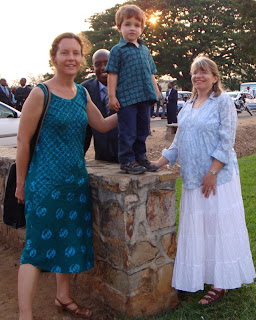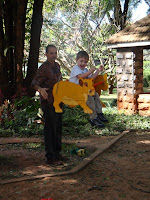 Denise and Marcelline on our porch with David.
Denise and Marcelline on our porch with David.I would say that this week might be described as feeling fairly normal. We are definitely over jet lag, and we had no unusual weeklong events that absorbed most of our time. Settling into a rhythm of a daily routine again felt pretty good. We did not have any guests staying at the house this week either as Jodi has gone back up country. (She was here during the conference last week.)
So what is our daily routine? Since we share our job it is a bit different than our work in the States where I would go off to Vassar and Rebecca would watch Oren and then we would switch midway in the day. Now we all leave together and Rebecca and I pretty much spend the whole day together either in the office or at home. Here is a breakdown of the daily routine:
6:00 am—Paul gets up and starts coffee and reads the NY Times online
6:15 am Paul wakes up Oren and makes him breakfast and packs his snack for school
6:30 Rebecca wakes up and showers then feeds David
7:00 Breakfast for Rebecca and Paul then Paul dresses Oren and gets David in car seat.
7:30 Everyone gets in the car and we take Oren to school
8:00 Paul and Rebecca go to the office with David and work.
12:00 Paul and Rebecca and David go and pick up Oren from school on the way home for lunch.
12:30 lunch for all
1:00 Denise takes care of Oren until 5:00 (and David too if we are home.)
2:00 Rebecca has French (M and W)
3:00 Paul has Kirundi (M and W)
5:30 staff leaves (Marcelline leaves dinner on the stove)
6:00 dinner
Evenings vary, we usually have the evenings free though. This is just not a culture of evening meetings (probably because of the insecurity of the recently ended war.) We do have Bible study once a week on Tuesday’s but other nights we spend time as a family. That is quite a change for us. Without TV we are enjoying playing games together or reading stories.
8:00 Oren takes a bath and is in bed before 9:00.
Rebecca and I sometimes do a little more work on the computer after 9:00 especially right now while we have to do a lot of catching up and entering next year’s plans from our partners on our database. Rebecca and I usually do this together. I translate the plans into English and she enters them into the database.
This year we are definitely facing challenges as MCC is doing some belt-tightening in its International Programs due to the financial crisis. This makes assessing our plans a project of making hard choices about where to put our program’s resources. So many of them are doing such worthwhile work I feel like we are asking questions like, who shall we decrease? Widows or orphans? Prisoners or refugees? Peace work or AIDS awareness? (These are actually hypothetical examples, but it gives you an idea about what kinds of hard choices we are making.)
This Friday I attended a day long meeting on income-generating activities for organizations and communities. It was interesting to consider ways we might promote an entrepreneurial spirit among our communities.
I became aware of one of the great challenges of doing this while we were talking. For me, the essence of the entrepreneurial spirit is not only seeing an opportunity to sell something to make money and to market it, but also the willingness to put off a short term gain in order to reinvest in the project to expand it. Ex:
If I have a bicycle and I am bringing charcoal to Bujumbura from upcountry, I would have an eye on trying to augment my business by using some of my profit to say, buy another bicycle, perhaps to rent to someone else, to make more money. Then eventually reinvest and buy a truck, etc.
But I have not seen this to be the trend here, and for good reason. Putting off the benefit of a return requires some optimistic view of the future. If all of my experience tells me that I might not live to the end of the month, it is hard to project into the future for a large return on my investment. The trend I find here is that there is very little capital accumulation. Money earned is spent pretty much immediately, or shared in the community. To change a mindset from a subsistence mentality to one of capital accumulation is a challenge that I do not feel the seminar had a good response to. But perhaps, as people have more confidence in a present peace, they will develop confidence in a good future. I am hoping Burundi and the Great Lakes region is moving in this direction.
 The conference was hosted by the Quaker Peace Network and organized to a great extent by Zachee’s wife Bridget. I have not taken the opportunity to write much about Bridget, but she has been doing peace and development work in the region for over 15 years. She is the peaceworker that really set the tone, I believe, for almost all the faith-based peace initiatives and trainings that are done in Burundi. (She had been working for MCC when she was doing this.) More than once she has put her life on the line to mediate between divided tutsi-hutu communities on the verge of war.
The conference was hosted by the Quaker Peace Network and organized to a great extent by Zachee’s wife Bridget. I have not taken the opportunity to write much about Bridget, but she has been doing peace and development work in the region for over 15 years. She is the peaceworker that really set the tone, I believe, for almost all the faith-based peace initiatives and trainings that are done in Burundi. (She had been working for MCC when she was doing this.) More than once she has put her life on the line to mediate between divided tutsi-hutu communities on the verge of war.She is a great resource for us and works with a group called CAPP, a Norwegian Quaker peace group. We co-support several local partners in Rwanda and Burundi and it is great to have her insight into how to help build their capacity.
I think I will diverge here to talk about Oren’s school. This has been a very challenging set of transitions for Oren: moving back to Burundi, then beginning a school in another language that meets 5 days a week for 4 hours a day. This is definitely out of the ordinary for an American 3 year old.
In the US, his 3 year old nursery school was only loosely structured, alternating between play and stories, etc. It was 2 days per week for 2 hours. Here, in premier maternelle, play is limited. Instead they emphasize structured activity, sitting quietly, listening, and learning skills like holding a crayon correctly.
Needless to say, he does not like it and complains it is too long. The first 3 day he went without tears, but he cried when we dropped him off most of the days this week. (On Friday he seemed to be more resigned to it and did not complain.) He does like routine and he wants Rebecca to drop him off and me to pick him up. Every day after school he has a huge smile on his face and asks me “Am I done with French school now?” (meaning for good!) I tell him “No”.
I don’t mean for the teachers or the school to sound cruel. I think his teachers are very nice, but there is just a lot of emphasis on discipline, structure and teaching skills such as writing and drawing. Oren has been a bit resistant according to his teacher, preferring to do his own thing, but it is only his second week. I hope this will be good for him and not something that makes him miserable and fearful of school. The teachers at the school assure me that the children get used to the routine and end up really liking the school. I hope that is true.
The language barrier is definitely a factor in all of this. Not being able to understand has got be hard. (Actually his teachers do know English so they can understand him and talk to him in English if necessary) but instruction is in French. There is another boy in his class named Kirin who is in the same situation; he does not speak French either. I think Oren is finding a friend in him. I think that helped him go to school on Friday without tears.
 David continues to do well. He is still in the fairly-immobile, easy-to-care-for phase. He seems to not have much of a problem going to work with us and sitting in his car seat in the office while we work. He is also getting used to Denise who helps out with his care when Rebecca and I are both in language lessons.
David continues to do well. He is still in the fairly-immobile, easy-to-care-for phase. He seems to not have much of a problem going to work with us and sitting in his car seat in the office while we work. He is also getting used to Denise who helps out with his care when Rebecca and I are both in language lessons.Next week we will all (Rebecca, Oren, David and I) be going up to Rwanda to meet with partners and make arrangements for a conference we are having there in March. We will be going up alone so keep us in prayer. (I am sure Oren will be happy to miss 2 days of school!)
That remind me of something worth mentioning about Bujumbura. It is really changing! I think people are beginning to really believe in the peace that is evident as one looks around. The last rebel party has agreed to the terms of the peace agreement, roads are being rebuilt, businesses are opening, I think we will even be getting some higher speed internet soon. I don’t want to be overly optimistic, but it appears that people are beginning to feel confidence in the future again here.
I might add, with the election of Barack Obama, there is a real optimism that he will bring some kinds of changes to the region as well. (Don’t ask me how!) But it is good to be an American overseas right now! People here seem to have a new respect for our nation for electing him. Many Burundians watched the inauguration this week!
“Comfort, comfort my people,” says your God. “Speak tenderly to Bujumbura. Tell her that her warfare is accomplished and her iniquity is pardoned. Yes the Lord has punished her twice for all her sins.”
Isaiah 40:1-2

















